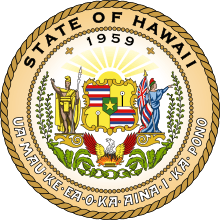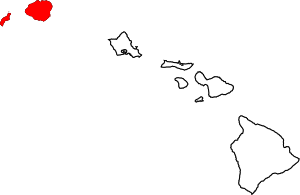Lihue, Hawaii
Lihue or Līhuʻe is an unincorporated community, census-designated place (CDP) and the county seat of Kauai County, Hawaii, United States. Lihue (pronounced [liːˈhuʔe]) is the second largest town on the Hawaiian island of Kauaʻi after Kapaʻa. As of the 2010 census, the CDP had a population of 6,455,[1] up from 5,694 at the 2000 census.
Lihue, Hawaii Līhuʻe | |
|---|---|
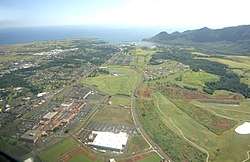 Aerial view of Lihue | |
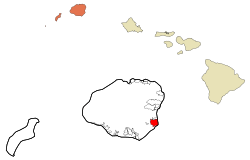 Location in Kauai County and the state of Hawaii | |
| Coordinates: 21°58′29″N 159°21′56″W | |
| Country | United States |
| State | Hawaii |
| County | Kauai |
| Area | |
| • Total | 7.5 sq mi (19.3 km2) |
| • Land | 6.7 sq mi (17.3 km2) |
| • Water | 0.8 sq mi (2.0 km2) |
| Elevation | 220 ft (67 m) |
| Population (2010) | |
| • Total | 6,455 |
| • Density | 968/sq mi (373.6/km2) |
| Time zone | UTC−10 (Hawaii-Aleutian) |
| ZIP code | 96766 |
| Area code(s) | 808 |
| FIPS code | 15-45200 |
| GNIS feature ID | 0361837 |
History
In ancient times, Lihue was a minor village. Līhuʻe means "cold chill" in the Hawaiian language.[2][3] Lihue is in the ancient district of Puna, the southeastern coast of the island, and the land division (ahupuaʻa) of Kalapaki.[4] Royal Governor Kaikioʻewa officially made it his governing seat in 1837, moving it from Waimea;[5] he gave the town its name after the land he owned on Oahu by the same name.
With the emergence of the sugar industry in the 1800s, Lihue became the central city of the island with the construction of a large sugar mill. Early investors were Henry A. Peirce, Charles Reed Bishop and William Little Lee. The plantation struggled until William Harrison Rice built the first irrigation system in 1856.[6]
Subsequent plantation owner Paul Isenberg helped German people emigrate to Lihue starting in 1881, with the first Lutheran church in Hawaii founded in 1883.[7] Services were held in German well into the 1960s. By the 1930s, George Norton Wilcox became one of the largest sugarcane plantation owners, buying Grove Farm from Hermann A. Widemann.[8] The Wilcox family home, Kilohana, has been converted into a restaurant and gift shop. The surrounding plantation now grows crops and livestock. A narrow-gauge tourist railroad with vintage diesel locomotives from Whitworth and General Electric offers tours of the plantation; horse-drawn carriage tours are offered as well. The grounds are also the site of luaus, many of which are offshore excursions booked through NCL America. Lihue also houses the Kauai Museum, which details the history of Kauai.[9]
Geography and climate
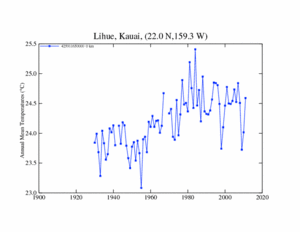
Lihue sits on the eastern side of the island of Kauai and is bordered by Hanamaulu to the north and Puhi to the west. Its shorefront on the Kauai Channel of the Pacific Ocean extends from Hanamaulu Bay in the north to the larger Nawiliwili Bay to the south. Hawaii Route 50 leads west from Lihue 12 miles (19 km) to Kalaheo and beyond to the western side of the island, while Hawaii Route 56 leads north 7 miles (11 km) to Kapaa and onwards to the northern side of the island.
According to the United States Census Bureau, the Lihue CDP has a total area of 50 square kilometres (19.3 sq mi), of which 6.7 square miles (17.3 km2) are land and 0.77 square miles (2.0 km2), or 10.42%, are water.[1]
Lihue has a tropical wet and dry climate zone (Köppen classification As) with a relatively dry summer season.[10] The normal monthly mean temperature ranges from 71.6 °F (22.0 °C) in February to 79.7 °F (26.5 °C) in August. On average, there are 7.7 nights annually with a low below 60 °F (16 °C), and readings of 90 °F (32 °C) or higher are quite rare, occurring on average once every eight years. Temperature records range from 46 °F (8 °C) on January 14, 1930 up to only 91 °F (33 °C) as recently as September 4–8, 2019. The record cool daily maximum is 67 °F (19 °C) as recently as December 19, 1981, while, conversely, the record warm daily minimum is 81 °F (27 °C) as recently as September 7–9, 2019.[11]
Normal annual rainfall is 37.05 inches (941 mm) spread over an average 195 days, but observed annual rainfall has ranged from 16.40 to 74.40 inches (417 to 1,890 mm) in 1983 and 1982, respectively. The wettest month on record is March 2006 with 36.13 inches (918 mm), while the most rain to occur in a single calendar day is 15.81 inches (402 mm) on May 13, 1940. The record driest month is February 1983 with trace amounts.[11]
| Climate data for Lihue Airport, Hawaii (1981–2010 normals,[lower-alpha 1] extremes 1905–present)[lower-alpha 2] | |||||||||||||
|---|---|---|---|---|---|---|---|---|---|---|---|---|---|
| Month | Jan | Feb | Mar | Apr | May | Jun | Jul | Aug | Sep | Oct | Nov | Dec | Year |
| Record high °F (°C) | 87 (31) |
89 (32) |
88 (31) |
88 (31) |
89 (32) |
89 (32) |
91 (33) |
91 (33) |
91 (33) |
91 (33) |
89 (32) |
89 (32) |
91 (33) |
| Mean maximum °F (°C) | 82.7 (28.2) |
82.3 (27.9) |
82.4 (28.0) |
82.2 (27.9) |
83.7 (28.7) |
84.7 (29.3) |
86.0 (30.0) |
86.6 (30.3) |
86.9 (30.5) |
86.1 (30.1) |
84.1 (28.9) |
82.6 (28.1) |
87.6 (30.9) |
| Average high °F (°C) | 78.0 (25.6) |
77.8 (25.4) |
78.4 (25.8) |
79.2 (26.2) |
81.2 (27.3) |
83.3 (28.5) |
84.2 (29.0) |
84.7 (29.3) |
84.8 (29.3) |
83.4 (28.6) |
80.8 (27.1) |
78.8 (26.0) |
81.2 (27.3) |
| Daily mean °F (°C) | 71.7 (22.1) |
71.6 (22.0) |
72.7 (22.6) |
74.0 (23.3) |
75.8 (24.3) |
78.1 (25.6) |
79.1 (26.2) |
79.7 (26.5) |
79.4 (26.3) |
78.1 (25.6) |
75.8 (24.3) |
73.2 (22.9) |
75.8 (24.3) |
| Average low °F (°C) | 65.5 (18.6) |
65.5 (18.6) |
67.0 (19.4) |
68.8 (20.4) |
70.4 (21.3) |
73.0 (22.8) |
74.1 (23.4) |
74.6 (23.7) |
74.1 (23.4) |
72.9 (22.7) |
70.8 (21.6) |
67.6 (19.8) |
70.4 (21.3) |
| Mean minimum °F (°C) | 58.3 (14.6) |
58.1 (14.5) |
59.7 (15.4) |
63.0 (17.2) |
64.4 (18.0) |
69.0 (20.6) |
70.2 (21.2) |
70.6 (21.4) |
69.2 (20.7) |
66.9 (19.4) |
64.3 (17.9) |
59.9 (15.5) |
56.4 (13.6) |
| Record low °F (°C) | 46 (8) |
47 (8) |
47 (8) |
51 (11) |
54 (12) |
59 (15) |
59 (15) |
60 (16) |
59 (15) |
55 (13) |
51 (11) |
50 (10) |
46 (8) |
| Average rainfall inches (mm) | 3.75 (95) |
3.16 (80) |
4.61 (117) |
2.25 (57) |
2.07 (53) |
1.61 (41) |
1.87 (47) |
2.13 (54) |
2.12 (54) |
3.82 (97) |
4.46 (113) |
5.20 (132) |
37.05 (941) |
| Average rainy days (≥ 0.01 inch) | 13.1 | 12.1 | 15.3 | 16.6 | 14.2 | 17.2 | 19.4 | 18.3 | 16.3 | 17.2 | 17.6 | 17.5 | 194.8 |
| Average relative humidity (%) | 76.1 | 75.4 | 75.3 | 75.2 | 74.9 | 73.5 | 73.9 | 74.0 | 74.1 | 76.2 | 76.8 | 76.5 | 75.2 |
| Mean monthly sunshine hours | 176.2 | 181.7 | 206.5 | 202.8 | 243.6 | 248.3 | 257.9 | 263.3 | 242.1 | 207.7 | 161.4 | 160.7 | 2,552.2 |
| Percent possible sunshine | 52 | 57 | 55 | 53 | 60 | 61 | 62 | 66 | 66 | 58 | 48 | 48 | 58 |
| Source: NOAA (relative humidity and sun 1961−1990)[11][12][13] | |||||||||||||
Demographics
As of the census[14] of 2000, there were 5,694 people, 2,178 households, and 1,420 families residing in the CDP. The population density was 898.3 people per square mile (346.6/km2). There were 2,399 housing units at an average density of 379.8 per square mile (146.6/km2). The racial makeup of the CDP was 22.8% White, 49.2% Asian, 0.2% Black or African American, 0.2% Native American, 6.4% Pacific Islander, 0.7% from other races, and 20.5% from two or more races. 6.5% of the population were Hispanic or Latino of any race.
There were 2,178 households, out of which 25.8% had children under the age of 18 living with them, 48.9% were married couples living together, 11.8% had a female householder with no husband present, and 34.8% were non-families. 29.9% of all households were made up of individuals, and 16.1% had someone living alone who was 65 years of age or older. The average household size was 2.55 and the average family size was 3.16.
In the CDP the population was spread out, with 22.8% under the age of 18, 5.2% from 18 to 24, 23.7% from 25 to 44, 25.8% from 45 to 64, and 22.4% who were 65 years of age or older. The median age was 44 years. For every 100 females, there were 92.2 males. For every 100 females age 18 and over, there were 90.6 males.
The median income for a household in the CDP was $44,906, and the median income for a family was $56,875 in 2000. Males had a median income of $38,713 versus $28,032 for females. The per capita income for the CDP was $22,619. 4.6% of the population and 1.7% of families were below the poverty line. Out of the total population, 1.4% of those under the age of 18 and 7.3% of those 65 and older were living below the poverty line.
Transport
Lihue is served by Lihue Airport, in the eastern part of the community.[15] The main seaport for Kauai is at Nāwiliwili Bay, directly southeast of town. Lihue is also served by The Kauaʻi Bus, a public bus system serving the entire island of Kauai.
Facilities
The town is home to the county administration building; Kauai's largest shopping center, Kukui Grove Center, which houses the island's only big department store, Macy's; and several big-box stores including, Wal-Mart, Home Depot and Costco. There are also several car dealerships, movie theaters and restaurants.
Education
Lihue is home to Kauai Community College, part of the University of Hawaii system.
Lihue is also served by the Hawaii Department of Education. Two K-5 elementary schools — Wilcox Elementary School in Lihue, and Kaumualii Elementary School in downtown Hanamaulu, Hawaii — serve the area. All of the area is zoned to Kamakahelei Middle School and Kauai High School.
Island School, a private pre-kindergarten to 12 school, is also located in Lihue.
Notes
- Mean monthly maxima and minima (i.e. the expected highest and lowest temperature readings at any point during the year or given month) calculated based on data at said location from 1981 to 2010.
- Records are based on data under "Lihue Area"
References
- "Geographic Identifiers: 2010 Demographic Profile Data (G001): Lihue CDP, Hawaii". American Factfinder. U.S. Census Bureau. Retrieved February 4, 2019.
- Mary Kawena Pukui, Samuel Hoyt Elbert and Esther T. Mookini (2004). "lookup of Lihue ". in Place Names of Hawai'i. Ulukau, the Hawaiian Electronic Library, University of Hawaii Press. Retrieved September 24, 2010.
- Lloyd J. Soehren (2010). "lookup of Lihue ". in Hawaiian Place Names. Ulukau, the Hawaiian Electronic Library. Retrieved September 24, 2010.
- Lloyd J. Soehren (2010). "lookup of Lihue ". in Hawaiian Place Names. Ulukau, the Hawaiian Electronic Library. Retrieved September 24, 2010.
- Daniel Harrington. "Līhuʻe". Hawaiian Encyclopedia. Mutual Publishing. Retrieved 2010-04-12.
- "Lihue Plantation Company History (Kauai)". Hawaiian Sugar Planters' Association Plantation Archives. University of Hawaii at Mānoa Library. 2004. Retrieved September 17, 2010.
- "Our History & Heritage". official web page. Lihue Lutheran Church. Retrieved September 24, 2010.
- "History". Grove Farm web site. Retrieved September 17, 2010.
- "Kauaʻi Museum". official web site. Retrieved September 17, 2010.
- Kottek, M.; Grieser, J. R.; Beck, C.; Rudolf, B.; Rubel, F. (2006). "World Map of the Köppen-Geiger climate classification updated" (PDF). Meteorol. Z. 15 (3): 259–263. doi:10.1127/0941-2948/2006/0130.
- "NowData - NOAA Online Weather Data". National Oceanic and Atmospheric Administration. Retrieved 21 September 2019.
- "HI Lihue WSO AP". National Oceanic and Atmospheric Administration. Retrieved 11 March 2015.
- "WMO climate normals for Lihue, Kauai, HI 1961−1990". National Oceanic and Atmospheric Administration. Retrieved 11 March 2015.
- "U.S. Census website". United States Census Bureau. Retrieved 2008-01-31.
- "Lihue CDP, Hawaii Archived 2011-11-19 at the Wayback Machine." U.S. Census Bureau. Retrieved on May 21, 2009.
| Wikimedia Commons has media related to Lihue, Hawaii. |
